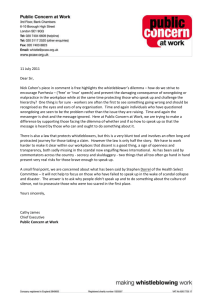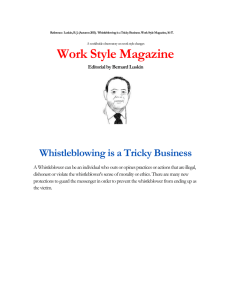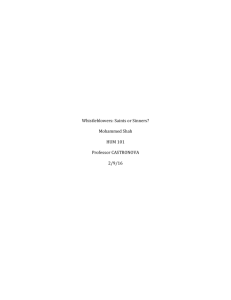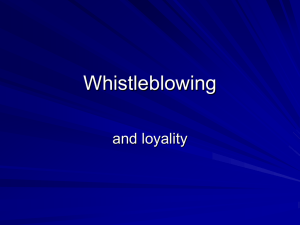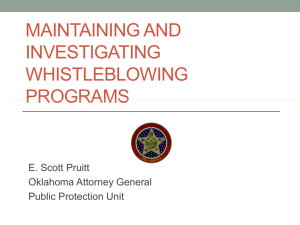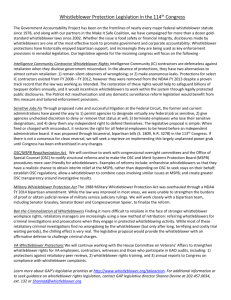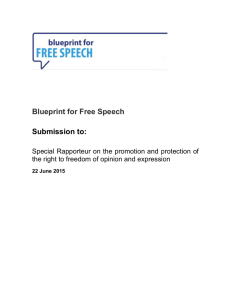20140613_Whistleblower
advertisement
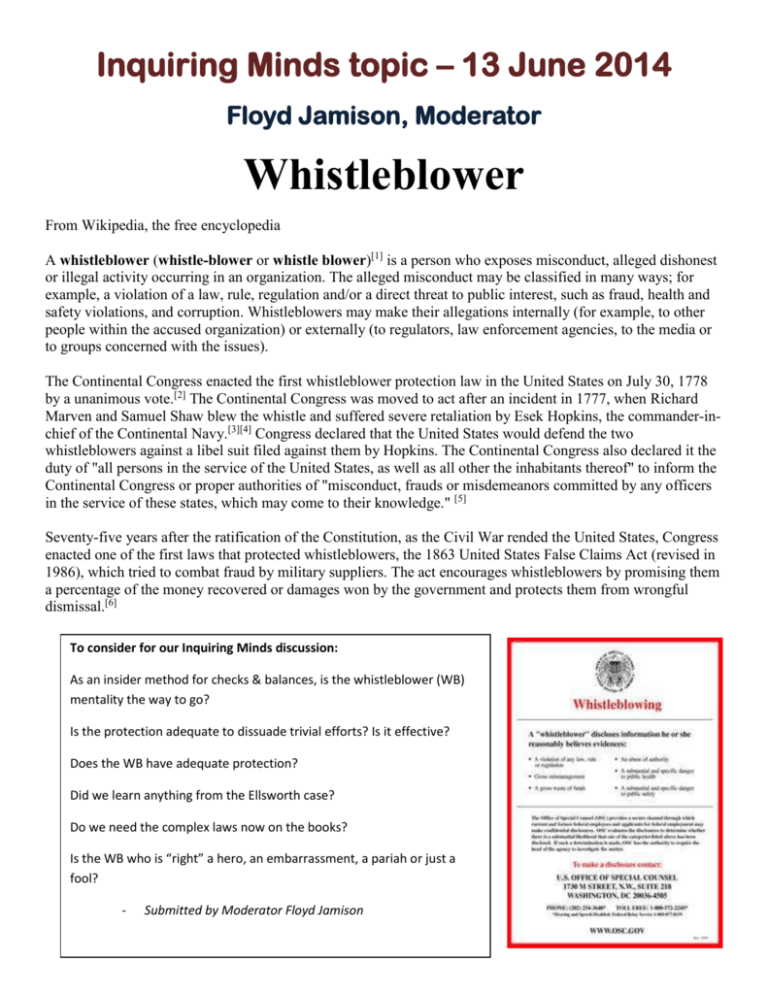
Inquiring Minds topic – 13 June 2014 Floyd Jamison, Moderator Whistleblower From Wikipedia, the free encyclopedia A whistleblower (whistle-blower or whistle blower)[1] is a person who exposes misconduct, alleged dishonest or illegal activity occurring in an organization. The alleged misconduct may be classified in many ways; for example, a violation of a law, rule, regulation and/or a direct threat to public interest, such as fraud, health and safety violations, and corruption. Whistleblowers may make their allegations internally (for example, to other people within the accused organization) or externally (to regulators, law enforcement agencies, to the media or to groups concerned with the issues). The Continental Congress enacted the first whistleblower protection law in the United States on July 30, 1778 by a unanimous vote.[2] The Continental Congress was moved to act after an incident in 1777, when Richard Marven and Samuel Shaw blew the whistle and suffered severe retaliation by Esek Hopkins, the commander-inchief of the Continental Navy.[3][4] Congress declared that the United States would defend the two whistleblowers against a libel suit filed against them by Hopkins. The Continental Congress also declared it the duty of "all persons in the service of the United States, as well as all other the inhabitants thereof" to inform the Continental Congress or proper authorities of "misconduct, frauds or misdemeanors committed by any officers in the service of these states, which may come to their knowledge." [5] Seventy-five years after the ratification of the Constitution, as the Civil War rended the United States, Congress enacted one of the first laws that protected whistleblowers, the 1863 United States False Claims Act (revised in 1986), which tried to combat fraud by military suppliers. The act encourages whistleblowers by promising them a percentage of the money recovered or damages won by the government and protects them from wrongful dismissal.[6] To consider for our Inquiring Minds discussion: As an insider method for checks & balances, is the whistleblower (WB) mentality the way to go? Is the protection adequate to dissuade trivial efforts? Is it effective? Does the WB have adequate protection? Did we learn anything from the Ellsworth case? Do we need the complex laws now on the books? Is the WB who is “right” a hero, an embarrassment, a pariah or just a fool? - Submitted by Moderator Floyd Jamison Whistleblowers frequently face reprisal, sometimes at the hands of the organization or group which they have accused, sometimes from related organizations, and sometimes under law. Questions about the legitimacy of whistle blowing, the moral responsibility of whistle blowing, and the appraisal of the institutions of whistle blowing are part of the field of political ethics. Overview Origin of term The term whistle-blower comes from the whistle a referee uses to indicate an illegal or foul play.[7][8] US civic activist Ralph Nader coined the phrase in the early 1970s to avoid the negative connotations found in other words such as "informers" and "snitches".[9] Internal Ryszard Kukliński believed that he would be able to prevent the war in Europe between the Warsaw Pact and NATO countries by handing in 40,265 pages of secret military documents of East Germany and People's Republic of Poland to CIA in West Germany Most whistleblowers are internal whistleblowers, who report misconduct on a fellow employee or superior within their company. One of the most interesting questions with respect to internal whistleblowers is why and under what circumstances people will either act on the spot to stop illegal and otherwise unacceptable behavior or report it.[10] There are some reason to believe that people are more likely to take action with respect to unacceptable behavior, within an organization, if there are complaint systems that offer not just options dictated by the planning and control organization, but a choice of options for absolute confidentiality.[11] External External whistleblowers, however, report misconduct to outside persons or entities. In these cases, depending on the information's severity and nature, whistleblowers may report the misconduct to lawyers, the media, law enforcement or watchdog agencies, or other local, state, or federal agencies. In some cases, external whistleblowing is encouraged by offering monetary reward. This is, however, an act of treason if one has signed non-disclosure agreements. Third Party The third party service involves utilising an external agency to inform the individuals at the top of the organisational pyramid of misconduct, without disclosing the identity of the whistleblower. This is a relatively new phenomenon and has been developed due to whistleblower discrimination. International Whistleblowers is an example of an organisation involved in delivering a third party service for whistleblowers. U.S. Law Under most federal whistleblower statutes, in order to be considered a whistleblower in the United States, the federal employee must have reason to believe his or her employer has violated some law, rule or regulation; testify or commence a legal proceeding on the legally protected matter; or refuse to violate the law. In cases where whistleblowing on a specified topic is protected by statute, U.S. courts have generally held that such whistleblowers are protected from retaliation.[12] However, a closely divided U.S. Supreme Court decision, Garcetti v. Ceballos (2006) held that the First Amendment free speech guarantees for government employees do not protect disclosures made within the scope of the employees' duties. Common reactions Ideas about whistleblowing vary widely. Whistleblowers are sometimes seen as selfless martyrs for public interest and organizational accountability; others view them unfairly as "traitors" or "defectors." Some even acccuse them of solely pursuing personal glory and fame, or view their behavior as motivated by greed in qui tam cases; however, such accusations might be expected of wrongdoers whose wrongdoing has been exposed. Some academics (such as Thomas Alured Faunce) feel that whistleblowers should at least be entitled to a rebuttable presumption that they are attempting to apply ethical principles in the face of obstacles and that whistleblowing would be more respected in governance systems if it had a firmer academic basis in virtue ethics.[13][14] It is probable that many people do not even consider blowing the whistle, not only because of fear of retaliation, but also because of fear of losing their relationships at work and outside work.[15] Persecution of whistleblowers has become a serious issue in many parts of the world: Employees in academia, business or government might become aware of serious risks to health and the environment, but internal policies might pose threats of retaliation to those who report these early warnings. Private company employees in particular might be at risk of being fired, demoted, denied raises and so on for bringing environmental risks to the attention of appropriate authorities. Government employees could be at a similar risk for bringing threats to health or the environment to public attention, although perhaps this is less likely.[16] There are examples of "early warning scientists" being harassed for bringing inconvenient truths about impending harm to the notice of the public and authorities. There have also been cases of young scientists being discouraged from entering controversial scientific fields for fear of harassment.[16] Although whistleblowers are often protected under law from employer retaliation, there have been many cases where punishment for whistleblowing has occurred, such as termination, suspension, demotion, wage garnishment, and/or harsh mistreatment by other employees. For example, in the United States, most whistleblower protection laws provide for limited "make whole" remedies or damages for employment losses if whistleblower retaliation is proven. However, many whistleblowers report there exists a widespread "shoot the messenger" mentality by corporations or government agencies accused of misconduct and in some cases whistleblowers have been subjected to criminal prosecution in reprisal for reporting wrongdoing. As a reaction to this many private organizations have formed whistleblower legal defense funds or support groups to assist whistleblowers; three such examples are the National Whistleblowers Center[17] in the United States, Whistleblowers UK [18] ] and Public Concern at Work[19] in the United Kingdom. Depending on the circumstances, it is not uncommon for whistleblowers to be ostracized by their co-workers, discriminated against by future potential employers, or even fired from their organization. This campaign directed at whistleblowers with the goal of eliminating them from the organization is referred to as mobbing. It is an extreme form of workplace bullying wherein the group is set against the targeted individual. The UK Government's Department of Business, Innovation and Skills (BIS) initiated a Whistleblowing Commission in October 2013 to explore whether there are any other aspects of the law governing whistleblowing which may not be protecting whistleblowers OR encouraging them to come forward about wrongdoing. The UK Government are endeavouring to encourage a cultural change on the workplace so that employees can feel confident enough to air concerns without fear of reprisal. Recognizing that the Public Interest Disclosure Act (PIDA) 1998 is more concerned with detriment after the whistleblowing event, the Whistleblowing Commission is particularly concerned with additional whistleblower protections that may be instituted from the very outset, or even from BEFORE the initial disclosure of wrongdoing, through a Whistleblower Registration Scheme overseen by an independent body. Recommendations and Guidelines across all industrial and governmental sectors are due publication in Spring 2014. The Netherlands has measures in place to mitigate the risks of whistleblowing: the whistleblower advice centre (Adviespunt Klokkenluiders) offers advice to whistleblowers, and the Parliament recently passed a proposal to establish a so-called house for whistleblowers, to protect them from the severe negative consequences that they might endure (Kamerstuk, 2013). Dutch media organisations also provide whistleblower support; on 9 September 2013 [20] a number of major Dutch media outlets supported the launch of Publeaks, which provides a secure website for people to leak documents to the media. Publeaks is designed to protect whistleblowers. It operates on the GlobaLeaks software developed by the Hermes Center for Transparency and Digital Human Rights, which supports whistleblower-oriented technologies internationally.[21] Legal protection Legal protection for whistleblowing varies from country to country and may depend on any of the country of the original activity, where and how secrets were revealed, and how they eventually became published or publicized. Over a dozen countries have now adopted comprehensive whistleblower protection laws which create mechanisms for reporting, investigate reports, and provide legal protections to the people who informed them. Over 50 countries have adopted more limited protections as part of their anti-corruption, freedom of information, or employment laws.[22] For purposes of the English Wikipedia, this section emphasizes the English-speaking world and covers other regimes only insofar as they represent exceptionally greater or lesser protections. United States Whistleblowing in the U.S. is affected by a complex patchwork of contradictory laws. In the United States, legal protections vary according to the subject matter of the whistleblowing, and sometimes the state in which the case arises.[23] In passing the 2002 Sarbanes–Oxley Act, the Senate Judiciary Committee found that whistleblower protections were dependent on the "patchwork and vagaries" of varying state statutes.[24] Still, a wide variety of federal and state laws protect employees who call attention to violations, help with enforcement proceedings, or refuse to obey unlawful directions. The first US law adopted specifically to protect whistleblowers was the 1863 United States False Claims Act (revised in 1986), which tried to combat fraud by suppliers of the United States government during the Civil War. The act encourages whistleblowers by promising them a percentage of the money recovered or damages won by the government and protects them from wrongful dismissal.[6] Another US law that specifically protects whistleblowers is the Lloyd–La Follette Act of 1912. It guaranteed the right of federal employees to furnish information to the United States Congress. The first US environmental law to include an employee protection was the Clean Water Act of 1972. Similar protections were included in subsequent federal environmental laws, including the Safe Drinking Water Act (1974), Resource Conservation and Recovery Act (1976), Toxic Substances Control Act of 1976, Energy Reorganization Act of 1974 (through 1978 amendment to protect nuclear whistleblowers), Comprehensive Environmental Response, Compensation, and Liability Act (CERCLA, or the Superfund Law) (1980), and the Clean Air Act (1990). Similar employee protections enforced through OSHA are included in the Surface Transportation Assistance Act (1982) to protect truck drivers, the Pipeline Safety Improvement Act (PSIA) of 2002, the Wendell H. Ford Aviation Investment and Reform Act for the 21st Century ("AIR 21"), and the Sarbanes–Oxley Act, enacted on July 30, 2002 (for corporate fraud whistleblowers). Investigation of retaliation against whistleblowers under 20 federal statutes falls under the jurisdiction of the Office of the Whistleblower Protection Program[25] of the United States Department of Labor's[26] Occupational Safety and Health Administration (OSHA).[27] New whistleblower statutes enacted by Congress which are to be enforced by the Secretary of Labor are generally delegated by a Secretary's Order[28] to OSHA's Office of the Whistleblower Protection Program (OWPP). The patchwork of laws means that victims of retaliation need to be alert to the laws at issue to determine the deadlines and means for making proper complaints. Some deadlines are as short as 10 days (for Arizona State Employees to file a "Prohibited Personnel Practice" Complaint before the Arizona State Personnel Board; and Ohio public employees to file appeals with the State Personnel Board of Review). It is 30 days for environmental whistleblowers to make a written complaint to the Occupational Safety and Health Administration (OSHA). Federal employees complaining of discrimination, retaliation or other violations of the civil rights laws have 45 days to make a written complaint to their agency's equal employment opportunity (EEO) officer. Airline workers and corporate fraud whistleblowers have 90 days to make their complaint to OSHA. Nuclear whistleblowers and truck drivers have 180 days to make complaints to OSHA. Victims of retaliation against union organizing and other concerted activities to improve working conditions have six months to make complaints to the National Labor Relations Board (NLRB). Private sector employees have either 180 or 300 days to make complaints to the federal Equal Employment Opportunity Commission (depending on whether their state has a "deferral" agency) for discrimination claims on the basis of race, gender, age, national origin or religion. Those who face retaliation for seeking minimum wages or overtime have either two or three years to file a civil lawsuit, depending on whether the court finds the violation was "willful." Those who report a false claim against the federal government, and suffer adverse employment actions as a result, may have up to six years (depending on state law) to file a civil suit for remedies under the US False Claims Act (FCA).[29] Under a qui tam provision, the "original source" for the report may be entitled to a percentage of what the government recovers from the offenders. However, the "original source" must also be the first to file a federal civil complaint for recovery of the federal funds fraudulently obtained, and must avoid publicizing the claim of fraud until the US Justice Department decides whether to prosecute the claim itself. Such qui tam lawsuits must be filed under seal, using special procedures to keep the claim from becoming public until the federal government makes its decision on direct prosecution. Federal employees could benefit from the Whistleblower Protection Act,[30] and the No-FEAR Act (which made individual agencies directly responsible for the economic sanctions of unlawful retaliation). Federal protections are enhanced in those few cases where the Office of Special Counsel will support the whistleblower's appeal to the Merit Systems Protection Board (MSPB). The MSPB rejects the vast majority of whistleblower appeals, however, as does the Federal Circuit Court of Appeals.[31] Efforts to strengthen the law have met with failure in recent years, but minor reforms seem likely. See, e.g.,Whistleblower Protection Enhancement Act of 2011, S. 743, H. Rep. 3289, 112th Cong. (2011). Wall Street Securities whistleblowers are provided incentives and protection by the Dodd–Frank Wall Street Reform and Consumer Protection Act (2010).[32] The SEC Office of the Whistleblower offers whistleblowers significant incentives and increases protection for whistleblowers in the SEC whistleblower program. This legislation authorizes the SEC to reward those who provide information concerning violations of the federal securities laws at companies that are required to report to the SEC. Further, the Dodd-Frank Act strengthens the whistleblower protection provisions of the False Claims Act, and contains one of the strongest confidentiality provisions for whistleblowers ever enacted. For the first time, whistleblowers will be allowed to initially report fraud anonymously by filing a claim through an attorney. Additionally, the law prohibits employers from retaliating against whistleblowers. Employers may not fire, demote, suspend, threaten, harass, or discriminate against a whistleblower. The Dodd-Frank Act expands the reach of whistleblower protections provided under the Sarbanes-Oxley Act of 2002 to include employees of public companies as well as employees of its private subsidiaries and affiliates. Whistleblowers who suffer from employment retaliation may sue for reinstatement, back pay, and any other damages incurred. The Office of the Whistleblower (SEC) The SEC Office of the Whistleblower was formed as part of the Dodd-Frank Act. They help handle whistleblower tips and complaints, and provide guidance to the Enforcement Division staff. They will help the Commission determine the size of awards for each whistleblower. Further, They assist whistleblowers by promoting the program, providing guidance and answering questions about the program.[33] The Whistleblower Program (US Commodity Futures Trading Commission) The CFTC’s whistleblower program – which was created by the Dodd-Frank Act – allows for the payment of monetary awards to eligible whistleblowers, and provides anti-retaliation protections for whistleblowers who share information with or assist the CFTC. US military The Military Whistleblower Protection Act[34] protects the right of members of the armed services to communicate with any member of Congress (even if copies of the communication are sent to others). US law enforcement Former NYPD officer, Frank Serpico, became law enforcement's best known whistleblower since the early 1970s when he testifyed before the Knapp Commission in 1971. Serpico was shot earlier that year during a Brooklyn drug raid in which his colleagues failed to protect him, but survived, although partially deaf. Serpico testified to the Knapp Commission in December, 1971 and retired in 1972 on a disability pension, living abroad until his quiet return to the U.S. in 1980, when he moved upstate, dividing his time between a technology-free rural cabin, a Brooklyn apartment and lecturing across the U.S. against police corruption. Michael Dowd became the NYPD's next best known whistleblower over 20 years later when he was arrested in 1992 for assaulting citizens, extortion from drug dealers, selling drugs and endangering dealers by delivering them to their rivals for extralegal violence. Dowd testified to the Mollen Commission in 1993 about his own and his colleagues' activities, was convicted in 1994 and sentenced to 14 years but paroled in 2004 after serving ten and was sent to a Brooklyn halfway house, ironically in one of the same neighborhoods that he used to patrol, under requirements of being suitably employed, but is unable to find any work because of his publicity and record. Ted Briseno became the Los Angeles Police Department's best-known whistleblower during the 1990s by testifying against his fellow officers in the state-level Rodney King trial in 1992. Because of his testimony in violation of law enforcement's unofficial Blue code of silence, however, Briseno couldn't find law enforcement employment anywhere. His property records now show him living in Illinois. Tax fraud The Internal Revenue service rewards whistleblowers with a percentage of the tax money and penalties recovered with the information provided. The Tax Relief and Health Care Act of 2006 pays whistlblowers up to 30% of any tax revenue recouped by the IRS as a result of a whistleblower's information.[35] In September 2012, the IRS Whistleblower Office awarded Bradley Birkenfeld $104 million as a whistleblower for his revelations that the Swiss bank UBS abetted tax evasion by 19,000 American clients.[36][37][38][39][36] The award was the largest whistleblower payout in history, to either an individual or a group.[40][41] The IRS explained its decision by citing Birkenfeld’s “exceptional cooperation” and the “breadth and depth” of the information he provided, all of which led to “unprecedented actions” against UBS.[42] The IRS and the U.S. Department of Justice used Birkenfeld's information to negotiate a $780 million settlement with UBS in 2009. Under that deal, UBS admitted to helping U.S. clients cheat on their taxes. The bank later turned over the names of nearly 5,000 U.S. clients suspected of tax evasion.[43] IRS amnesty programs have since collected $5 billion from people who participated in UBS’s illegal scheme based on the information provided by Birkenfeld.[42] Australia There are also laws in a number of states.[44] The former NSW Police Commissioner Tony Lauer summed up official government and police attitudes as: "Nobody in Australia much likes whistleblowers, particularly in an organisation like the police or the government." Mr Lauer's comments are clearly at odds with public support for WikiLeaks. Whistleblowers Australia is an association for those who have exposed corruption or any form of malpractice, especially if they were then hindered or abused.[45] Canada Canadian protection for whistleblowers is notoriously poor by English-speaking countries' standards. Until recently, there was no formal protection for those who spoke up from a position of knowledge inside government, with even senior civil servants (Shiv Chopra being one notable case) being fired or constructively dismissed for speaking up about internal abuses. In the private sector, the situation was even worse as Canada retained the unreformed common law of libel without the exceptions for public issues or public interest that were added in all other English-speaking countries. This made political libel cases unfortunately common, with one infamous case even filed by the Prime Minister himself versus Official Opposition for alleging that the Prime Minister, when in Opposition, had bribed MP Chuck Cadman.[citation needed] Historically, many Canadian private sector business scandals had come to light only through the intervention of the US SEC or other regulators (Garth Drabinsky, Conrad Black, Steven Bingham being three notable examples), due in part to the lack of whistleblower protections, plaintiff-friendly libel laws and a lack of investigative journalism due to these. Canadian government Canada's parliament has instituted the Public Sector Integrity Office (Canada), a parliamentary office for the protection for whistleblowers who speak up against abuses in government. However, that office was itself cast into some doubt when the first Integrity Commissioner, Christiane Ouimet, was heavily criticized in the auditor general's report in December 2010.[46][47] Cabinet minister Stockwell Day defended the office[48] but independent groups urged the re-opening of already closed files.[49][50] Jamaica In Jamaica, the Protected Disclosures Act, 2011[51] received assent in March 2011. It creates a comprehensive system for the protection of whistleblowers in the public and private sector. It is based on the UK's Public Interest Disclosure Act. India The Government of India has been considering adopting a whistleblower protection law for several years. In 2003, the Law Commission of India recommended the adoption of the Public Interest Disclosure (Protection of Informers) Act, 2002.[52] In August 2010, the Public Interest Disclosure and Protection of Persons Making the Disclosures Bill, 2010 was introduced into the Lok Sabha, lower house of the Parliament of India.[53] The Bill was approved by the cabinet in June, 2011. The Public Interest Disclosure and Protection of Persons Making the Disclosures Bill, 2010 was renamed as The Whistleblowers' Protection Bill, 2011 by the Standing Committee on Personnel, Public Grievances, Law and Justice.[54] The Whistleblowers' Protection Bill, 2011 was passed by the Lok Sabha on 28 December 2011.[55] and by the Rajyasabha on 21 February 2014. The Whistle Blowers Protection Act, 2011 has received the Presidential assent on May 9, 2014 and the same has been subsequently published in the official gazette of the Government of India on May 9, 2011 by the Ministry of Law and Justice, Government of India. Ireland The government of Ireland committed to adopting a comprehensive whistleblower protection law in January 2012. The bill will reportedly cover both the public and private sectors.[56] Other countries There are also comprehensive laws in New Zealand and South Africa. A number of other countries have recently adopted comprehensive whistleblower laws including Ghana, South Korea, and Uganda. They are also being considered in Kenya and Rwanda. The European Court of Human Rights ruled in 2008 that whistleblowing was protected as freedom of expression.[57] Legal acts United States Ceballos case and the Whistleblower Protection Act of 2007 The US Supreme Court dealt what many considered a major blow to government whistleblowers when, in the case of Garcetti v. Ceballos, 04-5, 547 US 410,[58] it ruled that government employees did not have protection from retaliation in performance evaluations by their employers under the First Amendment of the Constitution if the alleged speech was produced as part of his/her duties.[59] Ceballos did not dispute that his memo was made as part of his official duties. Whistleblowers who want to pursue a federal case under the First Amendment must now always claim the memos and writings made are part not only of the official duty but of a citizen's opinion and discourse of public relevance. This can be done by alleging that the cause for retaliation is not the text of the memo but the ideas surrounding it. In the case of Ceballos he could have argued that his protected speech was his concept of strict adherence to the rule of law. The free speech protections of the First Amendment have long been used to shield whistleblowers from retaliation by whistleblower attorneys. In response to the Supreme Court decision, the House of Representatives passed H.R. 985, the Whistleblower Protection Act of 2007. President George W. Bush, citing national security concerns, promised to veto the bill should it be enacted into law by Congress. The Senate's version of the Whistleblower Protection Act (S. 274), which has significant bipartisan support, was approved by the Senate Committee on Homeland Security and Governmental Affairs on June 13, 2007. However, it has yet to reach a vote by Senate as a hold has been placed on the bill by Senator Tom Coburn (R-OK).[60] According to the National Whistleblower Center, Coburn's hold on S. 274 has been done to further President Bush's agenda.[61] In December 2010, the Senate passed enhanced protections for government employees and contractors who report cases of waste, fraud and abuse.[62] California False Claims Act The California False Claims Act protects whistleblowers from retaliation from their employer under a section entitled: "Section 12653. Employer interference with employee disclosures."[63] Under this section, employers may not make rules that prevent an employee from disclosing information to the government in furtherance of a false claims action, an employer may not discharge, demote, suspend, threaten, harass, deny promotion to, or in any other manner discriminate against, an employee in the terms and conditions of employment because he or she has disclosed information to the government. Conscientious Employee Protection Act (CEPA) CEPA, New Jersey's whistleblower law, prohibits an employer from taking any retaliatory action against an employee because the employee does any of the following: Discloses, or threatens to disclose, to a supervisor or to a public body an activity, policy, or practice of the employer or another employer, with whom there is a business relationship, that the employee reasonably believes is in violation of a law, or a rule or regulation issued under the law, or, in the case of an employee who is a licensed or certified health care professional, reasonably believes constitutes improper quality of patient care; Provides information to, or testifies before, any public body conducting an investigation, hearing or inquiry into any violation of law, or a rule or regulation issued under the law by the employer or another employer, with whom there is a business relationship, or, in the case of an employee who is a licensed or certified health care professional, provides information to, or testifies before, any public body conducting an investigation, hearing or inquiry into quality of patient care; or Objects to, or refuses to participate in, any activity, policy or practice which the employee reasonably believes: is in violation of a law, or a rule or regulation issued under the law, or, if the employee is a licensed or certified health care professional, constitutes improper quality of patient care; is fraudulent or criminal; or is incompatible with a clear mandate of public policy concerning the public health, safety or welfare or protection of the environment.[64] "Concerning protection for health care workers who report patient safety information" in Colorado "Patient safety is of paramount importance in the delivery of health care to Colorado citizens. A patient is at his or her safest when a health care worker has the right to speak out on the patient's behalf without fear of reprisal or retaliation. Health care providers recognize that, in order to deliver the highest quality health care, it is imperative that all health care workers have the right to report patient safety concerns and to advocate for a patient's well being without the risk of disciplinary action or loss of employment."[65] Medical residents and extending whistleblower protection to enforce safety, health, and maximum work hour standards Other proposals have been made to extend federal whistleblower protection to medical residents working at health care facilities, hospitals, and health care providers, as an internal means to ensure that certain patient hospital and health standards are being effectuated, including enforcing maximum hour guidelines for medical residents[66] Best International Practices For Organizations All organizations, whether public, private, or non-profit (including governmental) should, as a best practice, adopt a robust whistleblower system to induce its employees to internally report illegal or excessively risky activity directly to its board of directors or trustees. Without a robust whistleblower system, directors/trustees of the organization may fail in their oversight responsibilities. A robust whistleblower system encourages internal reporting of misconduct so as to permit it to be corrected. It is particularly important in countries (such as the United States) which provide significant financial rewards to whistleblowers who externally report illegal behavior to government entities. There have been numerous examples of boards of directors/trustees who have been uninformed as to problems in the organization, even though lower level employees knew about these problems. These boards were misled because they relied primarily on top management and the auditors for their information.
